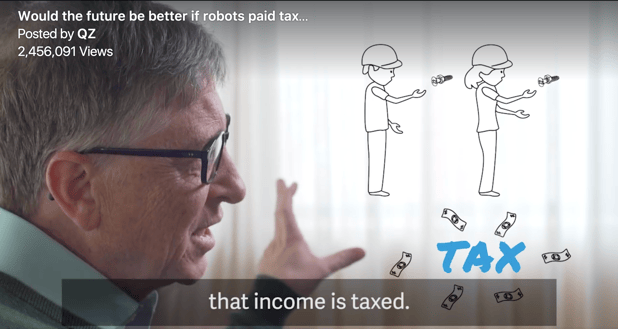Before we go… I’ll have the steak, extra fries, hold the tax
Every Friday we just want to stop the world for a moment and give you a couple of real tips to think about that will make a real difference to your business and in your life.
Can you feel it? Tax season is getting closer and closer and as we’ve often said, the key to victory is all in the planning. If you’re planning on forking over less tax to the government going forward, you’ll need to have a handle on the rules that affect deductibles from the largest piece of capital (10-colour large format printer anyone?) all the way down to the humble cup of coffee.
Yes coffee – it’s deductible in many circumstances because it can be considered an integral part of a “coffee” meeting with a client or indeed part of a more expansive work day snack.
I can’t believe coffee’s tax deductible, tell me more!
Look, this is very exciting news, especially to those of us with a fiendish coffee addiction but again, you must consider the circumstances. Lining up soy milk, cappuccinos at your favourite weekend breakfast spot while you peruse the sport pages does not conform to the spirit of the law. Paying for the coffee and triple choc muffin a valued client orders during the course of your business meeting, does. You are well within your rights to claim coffee as deduction if it is purchased and consumed in the furtherance of your business endeavours and yes, meetings with clients or fellow team mates when things simply need to get done, certainly qualify.
Here’s what else qualifies
Food. Within reason and under the right circumstances.
Tip: do not head down to your local supermarket, do a weekly shop for yourself and try to claim that. This will eventually lead to problems and a sweaty-palmed Q&A with the ATO.
Here are four circumstances under which you can confidently claim food:
- While travelling interstate on business. It can be within your state though, as long as you’re away overnight (easy done in WA with its 2.646million km2 ). $100/day is a safe and fair figure so help yourself to that pub grub or reasonably priced two courser but reconsider the 9 course degustation with matching wines in the city
- As part of a working lunch. Again, the ATO understands that sometimes business imperatives demand we work through lunch or stay back past dinner time. Within reason, you can claim that late night office pizza or lunchtime sandwich tray in the conference room.
- Inhouse/onsite catering facilities like canteens, hired chefs may serve up deductions for the company.
- Once again, those muffins and coffee that you paid for when you sat down with your visiting client – deductible.
The aim here is not simply to see how many deductions you can accrue. That would mean you’re losing sight of the larger goal: to increase profit so that your business can positively impact your family life. Make sure that there is a significant return on investment in the form of efficiencies or profit before you start ringing up deductions.
Have a great weekend and if you’re away working for the next couple of days, don’t forget to keep your receipts.
Protecting your home: What’s yours is yours – let’s keep it that way!
Why are we here? A wonderful question that people from all walks of life, in a number of locations around the world have asked down through the ages. Today, I’d like to focus on those of us who have stepped out and decided to create the best life they could for their family and themselves but entering into private enterprise. I’m talking to the business owner.
One of your measures of success may well be the ownership of the family home. This is one of the things that make the hours of toil worthwhile. We’ve often spoken about how to minimize those hours of toil by the way but again, this is about protecting what you’ve worked so hard to achieve. Home ownership.
A hard luck story
A gentleman owns a small, “hole-in-the-wall” style restaurant. It’s a neighbourhood favourite for those that like great food at a good price… you know the drill. Long story short, this little nook becomes pretty popular, growth opportunities beckon, he moves up the street to a larger location and the cash floodgates are open. So, wildly successful, years of toil have well and truly paid off – and they’ll continue to do so because now the whole family is helping out. Brother doing deliveries, wife taking care of takeaways, kids part-time waiting tables and learning the business.
Until…
One day, something goes wrong, only a handful of people know exactly what but it was most certainly avoidable – admin/bookkeeping anomalies, tax, something like that, apparently the business partner may have dropped the ball. The upshot?
Financial Armageddon! Suddenly, the fines, bills and recompense needed to be paid and made and what’s worse, the neighbourhood loses the best thing that happened to local food.
Even worse than that? Eventually, the family home and private assets came into play…
Take luck out of the equation with the right business structure
Okay, so that was a partnership that went horribly wrong and we’ve spoken about “partnership panic” previously. This was the other side of that coin, where personal assets (the home etc) were left exposed to the ravages of business debt. Here are just two of many steps to avoid that loss and heartbreak:
- Shelter under the protection offered by a company or trust business structure. With the guidance of a knowledgeable and helpful accountant, you can sleep easier at night (or the day if you’ve taken the late shift). Life becomes a lot easier when you know that whatever happens, the family home that you have worked so hard for is so much safer than if you chose another structure under which to operate.
- If you are a sole trader or in a partnership, you have potentially pared down the costs of doing business but in return you have taken on a fair bit of personal liability and risk (and potentially tax). You are the risk-taker. You need to recognise that and consider your spouse or relationship partner the asset-holder (which means the house etc would be exclusively in their name). Keeping these two entities separate goes a long way to insulating your assets against business risk.
At Inspire, one of our primary aims is to ensure that our clients achieve the best possible lifestyle for themselves and their families. Another is to ensure that they get to keep it.
In part two we’ll share ways you can (and should) minimize your tax.
Stop what you’re doing and learn how to stop procrastinating
Yes, I see the irony. Unless reading our Inspired Daily article is a scheduled part of your everyday work routine, there’s a chance that you’re procrastinating. You are doing almost anything else rather than simply getting on with what you are supposed to be doing. It happens to almost all of us at one point or another. Unfortunately, it’s happening with increasing regularity to almost everybody when they are supposed to be at their most productive.
Before I get to a couple of tips to help you stay on track, let’s look at some rapid fire examples of what stops us from getting started:
- Wow, I am actually really hungry, I better get a snack before I get into this
- Maybe I should read Inspired Daily, I just need some inspiration
- I work better under pressure
- I better check my messages, I am waiting for an important update
- Goodness, that benchtop is filthy, let me just wipe that down before I get started
- Oh wow! (insert name here) just got (fired/promoted/robbed/busted/hooked up/upstaged/embarrassed/harassed/arrested/awarded/rewarded…)
Let’s face it, many of us have never cleaned so diligently, read so intently or absorbed as much near useless data than when we have a looming deadline. It happens – unfortunately.
Great! We’ve admitted there’s a problem, now what?
The next step is always to try and understand a problem. Understanding the problem helps us to adopt or devise solutions that are sustainable rather than band-aid solutions that are temporary fixes at best.
Here’s part of what we know. Firstly, we are very good at associating environment and stimulus with a specific response. At night I go to bed… and fall asleep. I sit on my sofa and… watch TV. I arrive at a coffee shop… I ask for coffee.
Tip: Don’t take your laptop to the lounge room, park yourself in front of the TV and expect to study/work effectively if that’s where you normally binge watch your new favourite show. You’ll end up “just having a quick flick” and that will be that. Construct a work association in a particular place under specific conditions and get to it.
Your brain is full of chemicals and other stuff and no one’s actually certain about what all of it does but we do know that when we’re exposed to certain favourable stimuli, a reaction takes place that releases chemicals making us feel good. Alright, there’s more to it than that but that is definitely the gist. And it’s the reason why, when our mobile device pings and alerts us to the fact that someone:
- Likes our post
- Likes us
- Has sent a message
- Has tagged us or
- Generally given us some attention in some way or another
…we love it and we want more of it. The wanting more is the reason we keep our mobile devices so, SO close. All that is okay but let’s face it, it is burning a hole in our productive “doing stuff” hours. Which is not okay.
Tip: Put your phone on “flight mode” while you work on that one important thing. No pings, no alerts, no messages to stop you from starting.
Tip: There is such a thing as a newsfeed eradicator. Which is great if you can’t stop yourself from scrolling through your feed, robotically looking for something, anything to make you laugh or shake your fist or feel… something. Use it.
Halting procrastination is about understanding your triggers and limiting the negative effects by neutralising or controlling the cause. Remember, getting inspired is only half the battle, now it’s time to go and achieve something.
Simon says, “dopamine is dope”
Well not in so many words, but inspirational author, thought leader and speaker Simon Sinek blames part of the so-called “dealing with millennials” problem at the feet of dopamine-peddling social media. Agreed. We echo the notion that a disproportionate amount of time, energy and emotion is devoted to accruing likes and shares (not that kind) by those of us born since the mid to late eighties. He goes onto describe how legions of us are zoning out of the real world, to spend more time on line. It’s addictive and can be, if left unchecked, all-consuming. And if it’s a problem in business (and yes, sometimes it is), what do we do about it?
Shall we start with why?
A well-known biology lesson derived from a 2012 study, confirmed to the world that getting likes, PMs and replies on social media releases the “feel good” chemical dopamine. And true to its claim, it feels good. And we like to feel good – especially when we’re down so we have developed a tendency to pursue online affirmation – seemingly at all costs.
But we touched on all this during yesterday’s Inspired Daily focus on overcoming procrastination. The point to be made, absorbed and understood today, thanks to the thought catalyst that is Simon Sinek? Good interactions, blossom into great relationships, which eventually bear fruit in the form of sustainable business results and oftentimes an overflow of shared wellbeing. Sounds terrific.
Feeling good about business, can’t be that simple. Can it?
No. No it’s not. There’s far more to it than that but staying with the millennial theme, Simon does go on to boldly critique and expand on the four pillars of workplace unrest. They are entitlement, technology, impatience (or instant gratification) and environment.
Spend 15 minutes listening to this terrific and insightful sit down with Simon, courtesy of the Tom Bilyeu interview on Inside Quest and just drink in the common sense and logic.
One of my big takeaways from this is that we, the business owners, need to accept and embrace responsibility around setting expectations and building an environment where excellence wants to come and work. All of that said, I would recommend this video as not only a two-way eye-opener but a bit of a self-assessment as to where we are, where we’re coming from and therefore, where we’re going.
Needless to say, we liked this.
BAS Webinar: How to turn a BAS Deadline into a Business Lifeline
Autumn’s coming – enjoy the sun, embrace the cloud
Every Friday we just want to stop the world for a moment and give you a couple of real tips to think about that will make a real difference to your business and in your life.
Many small business owners around the country are, as we speak, in a white hot BAS panic because the deadline is just around the corner.
The world does not slow down so that we can fulfil our reporting obligations, in fact, it can seem like time speeds up the closer various due dates get. I’m not surprising anyone when I say this can affect family and leisure pursuits, so as we set sail for another weekend, unfortunately, many will already have allocated their time to “hitting the books”.
Even more unfortunate is the fact that many resign themselves to these intrusions on family time with a sigh and a “what do can you do?”
Here’s what you can do to reclaim your free time
Embrace the cloud – If you haven’t already switched to a cloud-based accounting software solution like Xero for example, you really need to look into. It basically uses automation and intuitive software to capture trends and complete basic admin jobs making tasks like invoicing and reconciliations less time-consuming.
Additionally, the various add-ons can arm you with the ready access to information you may already have trained yourself to wait ages for or simply go without. Now, if you need/want information that may help you make a business critical decision or seize on an opportunity, it’s there waiting for you. The next step is for you and your accountant to turn this ready availability of data into actionable steps towards securing and growing more profit and getting more out of life.
Tip: Selecting the right software solution that actually brings you benefits rather than muddying the waters can be confusing. Our tip is simply to speak to us about what information you might need. We’re more than happy to make a recommendation based on what will help you.
Are you sure, you’re sure?
Tip: get a second opinion when it comes to the important stuff.
Getting a second opinion is not just a sensible thing to do if your medical practitioner tells you to give up ice-cream. Anytime the opinion of a professional is going to influence an important decision that may affect your livelihood or the outlook of your loved ones, you want to be doubly sure about the advice. No better way than getting a second opinion and comparing the viewpoints and possible outcomes.
We’re heading into tax season very soon. This means that you’ll be making some decisions: deciding whether to continue down the road with the process you’ve become used to (lodge return, pay the bill) or seeing if you can reduce that tax bill by speaking to one of our team.
Fun fact: last tax year we saved our clients over million dollars just by taking a closer look at their situations and ensuring that they didn’t pay more than was necessary.
If you’ve been in business now for at least a couple of years and are turning over more than $250K per year, we feel really confident that we could save you $5,000 in tax savings immediately.
It might be worth having some second thoughts about this year’s tax strategy over the weekend and embracing some new opportunities.
Today’s BAS webinar can help you get it right
It probably doesn’t get more embarrassing than what popular host and celebrity Steve Harvey had to go through when he misread the score card and named the wrong contestant as winner of the 2015 Miss Universe. Let’s embrace the pain one more time. Yikes!
But many of us know someone who has badly misread or ignored their business scorecard and embarrassment on the world stage would have been the least of their problems. Happily, the amiable and now really, really, careful Steve Harvey, was asked back to host the following year’s event – all was forgiven. The tax office and the commercial environment in which we all operate is rarely as forgiving.
The bright side? BAS is more than just a chore – it can help you
Let’s focus on the chief benefit of BAS. If nothing else, it provides your business with a quarterly scorecard letting you know whether you’re up or down as well as a direct comparison to previous quarters. But leaving it at that is to ignore some other key benefits available to you if you know what you’re doing. By saving your spot at our “Make BAS Work for YOU” webinar today at 2.30pm AEST, Ben and I can help you:
- Manage your cashflow – sometimes the line between money for your BAS bill and operating capital become so blurry that things can become difficult. Let’s work on ensuring things are easier.
- Free your time – you already have a job. Business owner. The good news is that bookkeeper needn’t appear on your job description and you certainly shouldn’t be forced to wear that hat at night or on the weekends.
- Work your advisers – there’s more to delivering maximum benefit than ticking boxes and submitting forms (we think so, anyway). We want to share strategies that will make sure you get the most out of your team.
- Increase performance – knowing the score and understanding how to read it will instantly help you play the game better. This is also true in business. Let’s work on that together.
- Pay your fair share – Are common mistakes killing your bottom line? DIY business owners are realising more and more that inexperienced or stuck-in-their-ways accountants and even themselves are letting the side down. Time to put a stop to that.
Okay, we’re almost ready to go, enough reading, let’s get you booked in if you’re not already. And if you can’t join us, we’d still love to hear from you, so feel free to contact us when you’re ready.
Will “Siri” get done for tax evasion?
The thing about ground-breaking entrepreneurs is that they think differently about everyday situations by applying very different, often elevated, goals and functionality to common items and situations.
Back in the day we all thought about how sensible phones, phone lists/directories and maps were. So we put them in books and carried them around with us. A certain world famous innovator then said, “I agree with this in principle but like most important items (currency, keys, identification) shouldn’t it fit in our pocket for maximum accessibility and ease of use? Could we just load it onto a small phone?” I wasn’t there but we can’t completely rule this out as a scenario.
This sounds crazy but he has had some winning ideas
Bill Gates suggested during a recent sit down, that robots should/could pay taxes. Ridiculous! Almost as ridiculous as spruiking computer operating systems in the seventies and eighties… Let’s hear him out. Click here.
Just in case you’re super short on time, here’s the summary of that clip. Bill suggests that if factory workers get taxed, then so should the robots (or perhaps their manufacturers) who do similar work. Interesting but why? Well the premise of income tax is that the government can provide benefits to the wider community with the tax collected. Furthermore, those people who no longer need to do the redundant factory work can, instead, set to work helping with community services for example. The problem with this is that since robots do the work and are not taxed, there’s no tax money to provide funding for these other services.
If nothing else, this is a great example of thinking about something quite common and applying different thinking to address an everyday need. And we like that.
We think differently too
We don’t hold the key to modern day communications and content storage but we do think very differently about accounting services. This is important – especially at tax time. Or more importantly, before tax time. Three things to consider talking to us about:
- BAS deadlines are fast approaching and we want to ensure that you’re ready to benefit from this quarterly exercise [Webinar – How to make BAS work for you].
- Tax season is just over the horizon but with the earth circling the sun at a spectacular 110,000km/h it’ll be June 30 before you know it. Maybe give us a call sooner rather than later to make sure you don’t end up paying too much tax.
- Now is the time to make sure your tax deductible dollars do some good in the world. We are committed to ensuring that our income benefits worthy causes that positively impact the lives of those less fortunate and inspiring others to do likewise.
Here at Inspire, we want to make a difference to our clients, their businesses and their families but we feel we have to make a difference for that can’t do so for themselves. And let’s face it, the robots won’t help, they don’t use accountants because as Mr Gates points out – they don’t pay taxes. See you in court, Siri!
If you’d like to hear more about how you can save on taxes, make a difference to people’s lives or both, please do drop us a line.
The Price is Right… or is it?
Not enough thought goes into pricing. Either that or the wrong thought processes are applied to pricing. We see it time and time again in various businesses and particularly start-ups. Over the weekend I thought about the often-seen “closing down sales” as I did a bit of shopping. It occurred to me that there’s more to these sales than meets the eye, in part, because there’s more to pricing than meets the eye.
When it comes to products and services, it’s often a case of what should I sell it for as opposed to what do I need to sell it for. New businesses will often base their pricing on what they see their competitors doing instead of first understanding how much revenue they need to cover the rent, utilities, inventory, wages and the list goes on. Understanding that these items are critical to business owners’ ability to function commercially, covering these off in the price of what they’re selling will determine the viability of the enterprise.
It’s not just the small business owner that is faced with these realities, but at least they have the ability to set their own pricing. By adding value, varying services, getting creative with their marketing, price variations may sit well with the target market. However, there are some instances where the practitioner has a lot less wriggle room because the customer doesn’t understand or accept the true value of the services. So it becomes tricky when the customer bucks at the price. So what can you do?
Doctor Doctor, give me the news
Elizabeth Oliver, a GP based in Sydney, wrote an exceptional article that found its way into the Brisbane Times. It begins with a patient suggesting Dr Oliver was making easy money and ends with the realisation that after all costs have been accounted for, there’s not much left over. A realisation that for many GPs around the country is a bleak reality. From a $70 fee:
“35 per cent goes to the practice for rent, electricity, equipment, and to pay the receptionist and nurse. After tax, my Medicare levy and student debt, I receive $24.56.
But I bulk-billed him (the patient), which means I made $13.01. That dizzying sum covers sick, holiday and maternity leave, superannuation and about $8000 a year in fees, insurance and continuing training.”
Work out what you need to cover before setting your price
And for that matter, work out how much profit you need to make to ensure that you take home an amount that you can live on and live with. Remember, you probably didn’t get into small business to just scrape by. Think about desired lifestyle as well as contingencies.
Talk to us about all aspects of your business numbers because we believe that small businesses can, do and should benefit the owner(s) and their families. So it’s not just a matter of knowing your numbers but what your number should be. If you don’t, it may be you that pays a hefty price.
Concentrate on Concentration: Deliver more value and you’ll earn dollars
You’ve got to spend money to make money. Don’t put all your eggs in one basket. Save your pennies. These are all well-worn statements that contain more than a grain of common sense. The size of those grains depend on which business sector you operate in and what your priorities and needs are. Here’s one that is 100% true regardless of where you work, for whom or why.
“Change your focus from making money to creating more value and more money will follow as a consequence.”
In other words, the more valuable a product or service becomes in the eyes of the market, the more likely it is that demand will increase without you having to produce more. An example: the black, viscous fluid just beneath the unforgiving Texan terrain was essentially worthless until people realised that it would fuel transportation, industry and manufacturing. Another example: in this country, drinking water is and always was accessible and all but free until the perceived value of bottled water made buying it a near necessity. What about an example from the services side of business? Well, we’re just one of many businesses that find that offering a little extra time to chat with clients about their needs is the incubator of goodwill (on both sides) and of course repeat business.
Great! But how?
Good question and while every circumstance, goal and business is different, there is one thing in common that all paths that lead to success seem to have.
A (strategic) framework.
It sounds very simple but time and time again without a framework that is rigid enough to stop our inner entrepreneur from driving us off the rails yet flexible enough to accommodate adjustments, things get difficult very quickly. So what are we looking at exactly?
- Start with your vision, mission and values. What do you want, how will you achieve it and what governs your methodology (what you stand for and what you won’t stand for).
- Resourcing. Your assets.
- Liabilities. These need to be acknowledged, addressed and limited where possible.
There’s more. Quite a bit more but this is a basic framework checklist mapping how you might choose to deliver value and then deliver more value.
You can’t stick to a framework, or a set of guidelines or an operational plan… if you do not have one so this should be a priority.
Oh, about those distractions…
Here’s a brief and not very exhaustive list:
Novel shortcuts, your competition, the small stuff, important but not urgent, urgent but not important, premature diversification opportunities, shiny things, tax bills that seem a little too large (because they actually might be), regular bills, irregular bills, BAS (see you on the 24th of this month for our webinar), webinars – not related to your goals…
Feel free to add ten more of your own.
Final thought: if you establish the right strategic framework for your business you will find the time and resources to concentrate your value and add value to your life and those of people closest to you.









